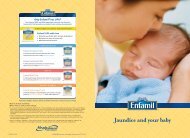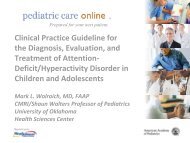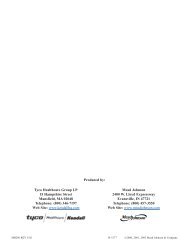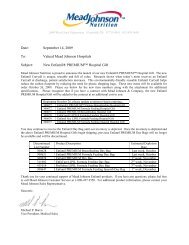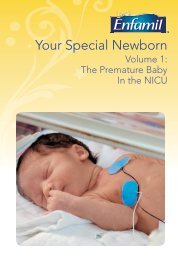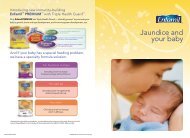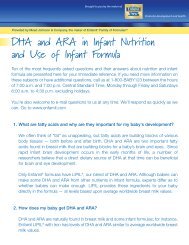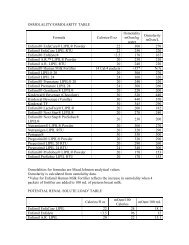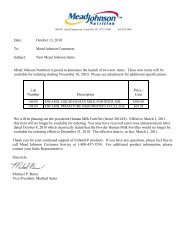LB2882MaternalNutriti+ - Mead Johnson Nutrition
LB2882MaternalNutriti+ - Mead Johnson Nutrition
LB2882MaternalNutriti+ - Mead Johnson Nutrition
Create successful ePaper yourself
Turn your PDF publications into a flip-book with our unique Google optimized e-Paper software.
INTRODUCTION<br />
A mother’s nutritional status, diet and lifestyle influence pregnancy and lactation outcomes and can have lasting<br />
effects on her offspring’s health. For example, inadequate intakes of certain micronutrients during pregnancy,<br />
such as folic acid and iodine, can contribute to birth defects and/or the inability of the child to develop to his or<br />
her full cognitive potential. In addition, maternal overweight and obesity are increasing globally and present major<br />
challenges for health care providers and their clients since overweight and obesity are associated with several<br />
adverse pregnancy outcomes including birth defects, gestational diabetes, pre-eclampsia and cesarean section. 41,42<br />
Undernutrition and overconsumption during fetal life may also influence the infant’s cognition and future risk of<br />
coronary heart disease, type 2 diabetes, stroke, obesity, and hypertension. 3,43-45 A mother’s consumption of potentially<br />
harmful substances, such as alcohol, during pregnancy can also have irreversible negative consequences.<br />
With the growing body of evidence indicating that a woman’s nutritional status and health-related behaviors both<br />
prior to and during pregnancy influence pregnancy outcomes and the child’s future health, experts are placing more<br />
emphasis on preconception and inter-pregnancy care. This includes screening for health risks that could affect the<br />
outcome of a future pregnancy. Many of those risks, such as poorly-controlled diabetes, hypertension, obesity, and<br />
a poor quality diet, are amenable to positive lifestyle changes. Women are encouraged to achieve and remain at a<br />
healthy body weight prior to pregnancy. 3 They should also be counseled regarding the benefits of physical activity,<br />
avoiding food faddism, consuming adequate folic acid and maintaining good control of medical conditions. 2 After<br />
conception has occurred, a balanced diet that supports appropriate maternal weight gain and meets maternal and<br />
fetal micronutrient needs contributes to creating a favorable intrauterine environment to support optimal pregnancy<br />
outcomes. 5 Good nutrition continues to be important after birth since a diet with insufficient levels of critical nutrients<br />
during lactation can deplete maternal stores and may lower nutrient levels in breast milk. Furthermore, breastfeeding<br />
beyond 6 months, regular physical activity and a balanced diet with an appropriate amount of energy help hasten the<br />
return to pre-pregnancy weight. 27<br />
Many countries around the world have issued diet and nutrient intake recommendations for their populations,<br />
including pregnant and lactating women, which are based on the countries’ food supply, food consumption patterns,<br />
and specific nutrition-related issues. 22 Other countries have adopted recommendations (Dietary Reference Intakes<br />
[DRI]) issued by the Institute of Medicine (IOM) of the National Academies in the United States or The World Health<br />
Organization (WHO). This monograph reviews current nutrition recommendations for women during pregnancy and<br />
lactation primarily from the renowned IOM and WHO. The goal in highlighting these nutrition recommendations is to<br />
increase familiarity with nutrients and nutrition-related issues that can have an important impact during pregnancy,<br />
lactation, and beyond.<br />
5





